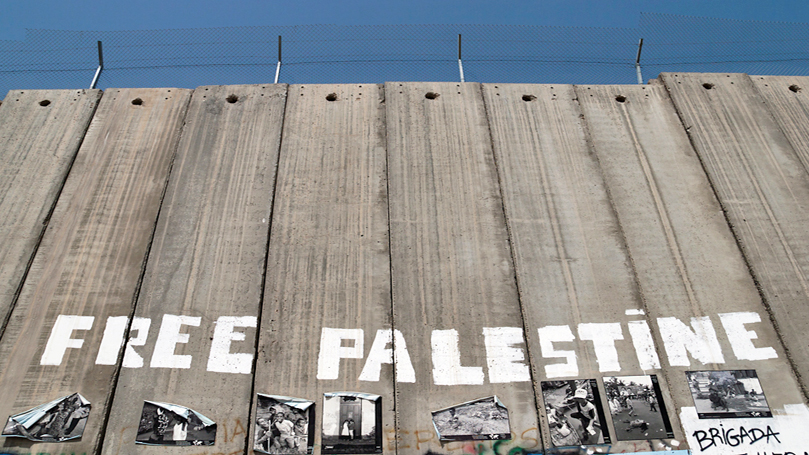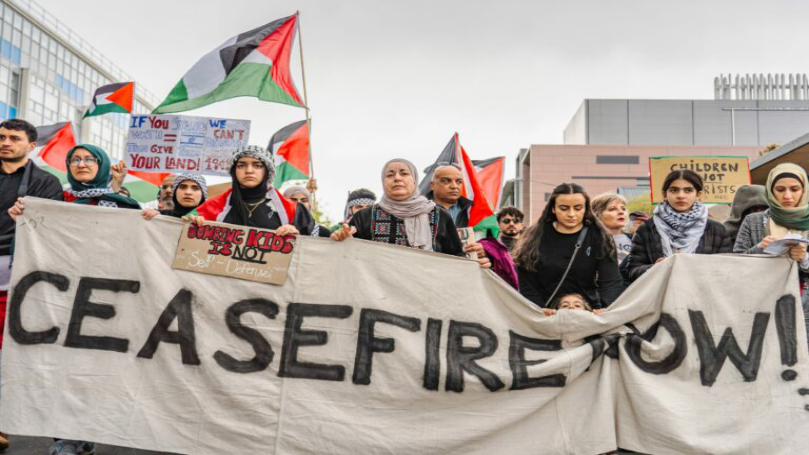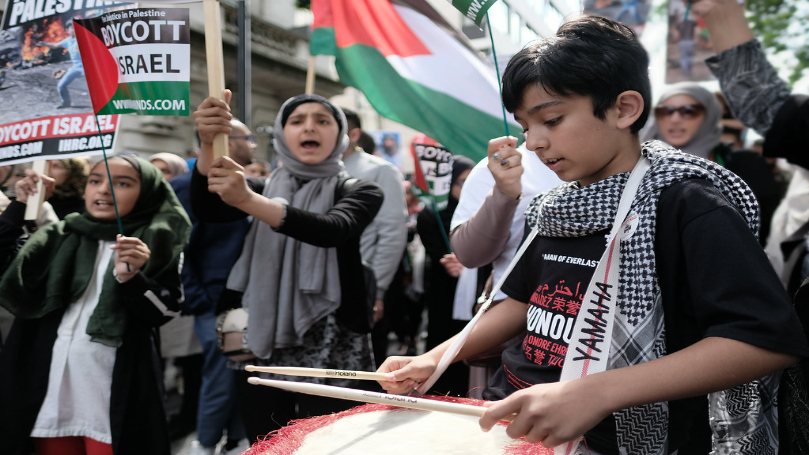
This piece is a contribution to the Pre-Convention Discussion for our 32nd National Convention. During Pre-Convention Discussion, all aspects of the party’s program, strategy, and tactics are up for consideration and debate. The ideas presented here are those of the author or authors alone, and do not necessarily reflect the positions of the Communist Party USA, its membership, or their elected leadership bodies. — Editors
In its approach to international issues over the past 105 years, the CPUSA has considered as its starting point the right to self-determination as a basic democratic principle. Thus, the party has refused to form its positions with respect to other countries’ affairs on a unilateral or idealistic basis. Instead, it has consulted with its fraternal parties — who are directly involved in working-class struggles on the ground in their respective countries — in order to gain an understanding of what is taking place there, how we can support those struggles, and what our role should be.
While immigrant populations in the U.S. are an important part of the struggle for democracy here in the U.S., and can be a resource regarding circumstances in their home countries, as a general group they also tend to come from higher income groups and bring with them a politics that corresponds to their social position. Therefore, our fraternal parties remain our most reliable link to the working class of other countries.
Given that Marxism-Leninism is not a dogma, but a science, the international Communist movement has placed great emphasis on the necessity of applying the strategy and tactics appropriate to a concrete situation. These often change in response to dynamic circumstances, shifts in the balance of forces, new information, and lessons learned through collective experience. This has been true here in the U.S., and the same has been true in Palestine.
According to past issues of Political Affairs and articles from our fraternal parties, up until 1947, the CPUSA, Soviet Union, and Communists in Palestine, supported a single, independent, democratic state of Palestine, with full equality of both Jewish and Arab people, and worked for Arab–Jewish unity, struggling to expose the role of British and U.S. imperialism in fomenting divisions between Jewish and Arab people. The CPUSA also supported, under certain conditions, (non-Zionist) Jewish immigration to Palestine.

Contradictions in the international situation made the issue a particularly thorny problem. Anti-Semitism was then (and remains today) a major feature of the fascist offensive. Jewish people were being persecuted and exterminated in Germany, Poland, Romania, and in other countries, and sought refuge in Russia, the U.S., Palestine, and elsewhere. Consequently, there were also progressive currents among Jewish people the world over, including among some Zionist forces. Zionism was also a tool of British and U.S. imperialism, which dovetailed with the objectives of fascist governments seeking to expel Jewish people. British and U.S. imperialism simultaneously worked to maintain conflict by supporting right-wing and adventurist trends among Arab nationalist forces. Many of these features remain relevant today.
In the aftermath of WWII, the ground began to shift. In May, 1947, two months after the U.S. ruling class unleashed its Truman Doctrine, Soviet representative to the UN Andrei Gromyko gave a speech to the UN outlining the four options being variously promoted, namely:
- The establishment of a single Arab–Jewish State, with equal rights for Arabs and Jews
- The partition of Palestine into two independent states, one Arab and one Jewish
- The establishment of an Arab state in Palestine, without due regard for the rights of the Jewish population; and
- The establishment of a Jewish state in Palestine, without due regard for the rights of the Arab population.
Gromyko stated that “the legitimate interests of both the Jewish and Arab populations of Palestine can be duly safeguarded only through the establishment of an independent, dual, democratic, homogeneous Arab–Jewish State,” but that “if this plan proved impossible to implement … then it would be necessary to consider the second plan.”
In November of 1947, the UN General Assembly adopted Resolution 181, establishing the state of Israel. CPUSA leader Hyman Lumar pointed out in a 1967 Political Affairs article that this was done “with the initiative and the active support of the Soviet Union, and in the face of opposition from Britain and the United States,” which had previously proposed partition plans along different lines. Today, the U.S. mouths support for the two-state solution, while implementing policies that undermine it.
Forerunners of the Palestinian People’s Party (PPP), our fraternal party in Palestine which has a seat on the Executive Committee of the Palestine Liberation Organization, initially opposed the partition plan, but soon approved the decision after studying the situation further, describing it as the “best of the bad solutions,” seeing that it was no longer a question of two states vs. one democratic state, but of two states vs. one Zionist state.
A (Google translated) article on the PPP website by Daoud Talhami argues the change in the Soviet position from 1947–48 was a tactical question based on a change in the balance of power in the context of the Cold War.

A member of the party’s Political Bureau wrote in 2013 that had the position of the PPP been taken at that time by other Arab forces, “the Nakba would not have occurred,” and the Palestinian people would have been able to build their state on half of historic Palestine, instead of today demanding less than a quarter of the land.
It was necessary at this juncture to struggle for an independent, democratic Israel by bringing progressive forces into the fight. CPUSA leader Alexander Bittelman wrote in 1947 that economic unity and political cooperation between the two states, as much as possible “approach[ing] the status of one state consisting of two equal nations,” would be essential.
“Do we want to help Israel grow and develop as a state of real democracy and social progress?” Bittelman asked in 1948, “or are we satisfied to let Israel become a cog in the … Anglo-American imperialist war machine?” The CPUSA has since defended the existence of Israel, while criticizing the policies of its government. Together with its fraternal parties in the region, it has also criticized forces within the Arab world working in concert with U.S. imperialism to sabotage a peaceful resolution, while defending the right of Palestinians to self-determination and a homeland.
“The central question,” noted a draft resolution for the 18th National Convention, “is the struggle against the role of U.S. imperialism in the Middle East,” which “allies itself with and arms the forces of reaction in the Arab world … and seeks to use Israel as a pawn. … This imperialist policy, which fans the flames of war … for the sake of the profits of a handful of monopolies, is equally opposed to the interests of the American people.”
“The issue,” Hyman Lumar wrote in 1967, “is oil.” U.S. policy was also aimed at militarizing and destabilizing the region surrounding the Soviet Union, and continues to frustrate the peaceful and independent development of the region.
The Israeli Communist Party (CPI), which today is majority Palestinian, was formed in 1948, after Israel’s founding. Together with the PPP, the CPI “fights for a just, comprehensive and stable Israeli-Arabic peace, centered on the end of the Israeli Occupation and an Israeli-Palestinian peace of two states for two Peoples: the establishment of a Palestinian State, whose capital is Eastern Jerusalem, alongside the State of Israel whose capital is Western Jerusalem, and the resolution of the Palestinian refugee problem based on the relevant UN resolutions.”

Today, leaders of the PPP say that, due to the current balance of forces in the region and generally, any attempt now to return to the one state solution will not result in a single democratic state, but in an apartheid state, and that support from the international community is needed to force Israel to withdraw to the 1967 borders and abide by the relevant UN resolutions.
When asked in a 2020 CPUSA interview about declining support for the two-state solution, CPI leader Aida Touma-Sliman responded, “I would differentiate between losing support for the two-state solution … and the fact that more people are losing hope.” Though surveys can only reflect public sentiment at a given moment in time, results from a 2023 opinion poll in Palestine support Touma-Sliman’s distinction. While 71% of Palestinians in the West Bank and Gaza said then that they “opposed” the two-state solution, and 74% said it was “no longer viable,” 69% also “opposed” or “strongly opposed” “abandon[ing] the two-state solution.” Confidence and trust in leading political forces in Palestine was also low.
Communists must always fight against demoralization and desperation, and help people gain the confidence that a struggle can be won.
At the CPUSA’s peace conference in November, PPP leader Aqel Taqaz said, “All Palestinian organizations … [are] fighting for a Palestinian independent state on the basis of the UN resolutions to establish a Palestinian state within the borders of 1967 with East Jerusalem as its capital, and the right of refugees to go back home, according to the UN resolution 194, and to free the Palestinian prisoners in Israeli jails. … We believe, after this conflict, that the international community will take responsibility, which was absent for 75 years, to have an international conference to solve the Palestinian issue, with the participation of the United Nations and other powers — regional and international — and not to leave the mediation under the U.S. hegemony, because this conflict showed that the U.S. is not neutral.”
It is our responsibility to help our fraternal parties and the working class and people of Palestine and Israel achieve this result. The first step is forcing our own government to accept and support an immediate and permanent ceasefire.
Images: Israeli West Bank barrier by Montecruz Foto (CC BY-SA 2.0 DEED); Ceasefire Now! – Rally For Palestine, Dunedin, NZ by Mark McGuire (CC BY 3.0 NZ); Drumming for Justice by Alisdare Hickson (CC BY-SA 2.0 DEED); Detroit Celtic Supporters show solidarity with Palestine (Twitter)
- Tags:
- 32nd National Convention
- ceasefire
- CPUSA 32 Convention Discussion
- Fraternal parties
- Gaza
- International
- International Communist Unity
- international cooperation
- International policy
- International Solidarity
- internationalism
- Israel
- Israel & Palestine
- Marxism
- Marxism-Leninism
- Palestine
- Political Affairs
- working class internationalism
- world communist movement


 Join Now
Join Now